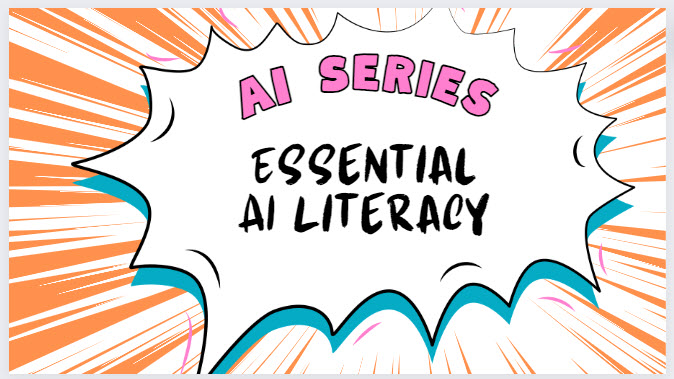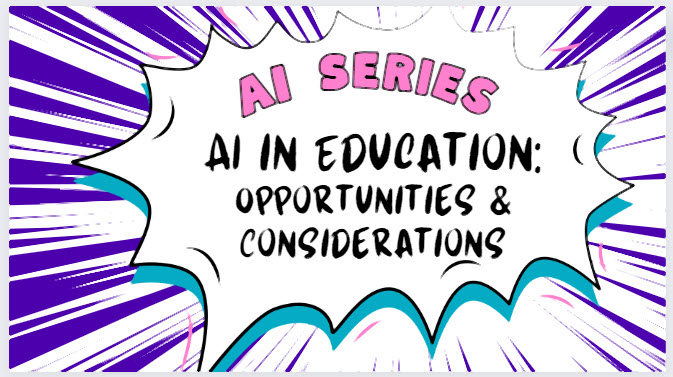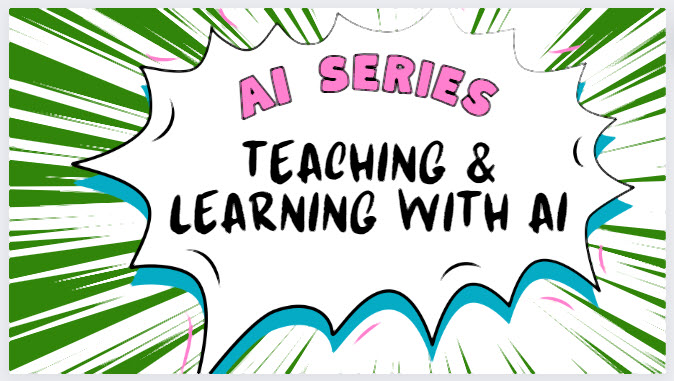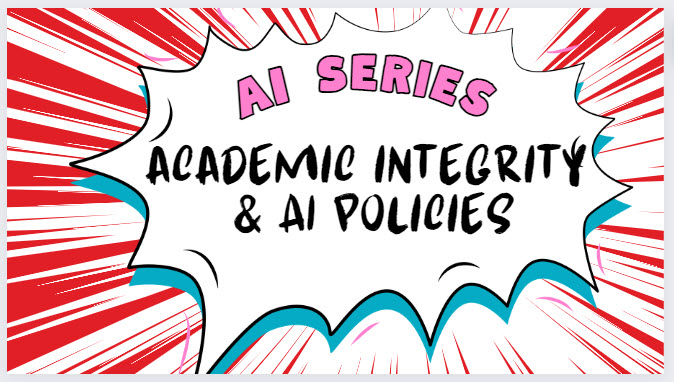Select the "Agenda" tab (on the right-side of the below Calendar) for an overview of what's taking place this week, and for the links to join online.
*NOTE: To request Flex credit for attending external workshops, please complete this External Training form.

College of the Canyon's Exploring AI Series contains four week-long courses designed to provide participants with an understanding of how generative AI technologies work, their capabilities and limitations, and a summary of ethical considerations related to their use:
-
Essential AI Literacy
-
AI in Education: Opportunities & Considerations
-
Teaching & Learning with AI
-
Academic Integrity & AI Policies
Click below to view the descriptions and learning outcomes for each course, and visit the Vision Resource Center calendar to see when each course is being offered and to enroll.
-
 Essential AI Literacy
Essential AI LiteracyEssential AI Literacy offers a practical introduction to generative artificial intelligence (AI) to provide participants with an understanding of how generative AI technologies work, its' capabilities and limitations, and a summary of ethical considerations related to its' use.
- Flex credit: 3 hours
- Enroll in Vision Resource Center (Cornerstone)
Learning Outcomes: Define "generative AI" and differentiate it from other forms of artificial intelligence; Summarize the capabilities and limitations of generative AI; Identify basic ethical considerations of generative AI.
 AI in Education: Opportunities & Considerations
AI in Education: Opportunities & ConsiderationsThis course will serve as a starting point to equip you with the knowledge and skills to optimize your teaching practices by leveraging AI for more engaging and effective learning experiences. We'll explore commonly used AI tools for education, critically analyze the advantages and limitations of generative AI models, and delve into strategies for crafting effective prompts for AI applications.
- Flex credit: 3 hours
- Enroll in Vision Resource Center (Cornerstone)
Learning Outcomes:
- Demonstrate comprehension of various AI technologies applicable to education, including adaptability to diverse learner needs, intelligent tutoring systems, and educational chatbots.
- Identify common AI tools that can be used to generate learning content.
- Identify ethical and social implications of teaching with generative AI, including issues related to students' future employability, bias, and privacy.
 Teaching & Learning with AI
Teaching & Learning with AIIn today's rapidly evolving educational landscape, understanding how to integrate AI technologies can greatly enhance teaching practices and student outcomes. In this course, you'll gain insights into how AI is being used to enhance student engagement, facilitate differentiated learning, foster critical thinking, and streamline assessment processes. We'll also explore ethical considerations you and your students will want to be aware of.
- Flex credit: 3 hours
- Enroll in Vision Resource Center (Cornerstone)
Learning Outcomes:
- Identify ways AI can be used to foster critical thinking in learning activities
- Identify how generative AI can be applied to educational materials—such as quiz questions, assignment instructions for differentiated learning, research projects, grading rubrics, and adapting a F2F assignment to online—to enhance student engagement, personalized learning, and assessment
- Utilize AI prompt engineering techniques to formulate and refine AI-generated content.
 Academic Integrity and AI Policies
Academic Integrity and AI PoliciesThere's no doubt that the integration of artificial intelligence (AI) technologies has brought forth both opportunities and challenges. In Academic Integrity and AI Policies, we'll unpack the interplay between AI technologies and academic integrity. You'll learn about AI plagiarism detectors and writing tools, gain insight into effective practices for using AI tools equitably and responsibly, and begin crafting thoughtful and comprehensive AI course policies.
- Flex credit: 3 hours
- Enroll in Vision Resource Center (Cornerstone)
Learning Outcomes:
- Articulate ways in which AI technologies (such as plagiarism detectors, spell checkers, essay generators) affect academic integrity
- Analyze ethical considerations associated with generative AI in higher ed (equity, access, academic integrity)
- Critically evaluate AI tools used for plagiarism detection and prevention (considering factors such as reliability, accuracy, and ethical/equity implications)
- Draft an AI policy (separate from a course academic integrity policy) for at least one existing or future course, outlining appropriate usage, ethical guidelines, assessment criteria, and student accountability.
Save the date: Friday, August 9, 2024 for the 10th Annual Online & Hybrid Instructor Retreat
Additional Training Opportunities
- Visit the Center for Excellence in Teaching and Learning for current COC faculty course and certificates.
- Visit the Online Network of Educators (@ONE) Online Course List to enroll in FREE professional development courses.
- Visit the California Community College Vision Resource Center for free online training through Linked In Learning.
- For information on receiving Flex credit, please contact College of the Canyons Professional Development.




